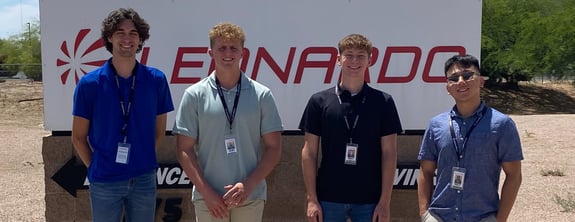
Investing in STEM: Internship Program
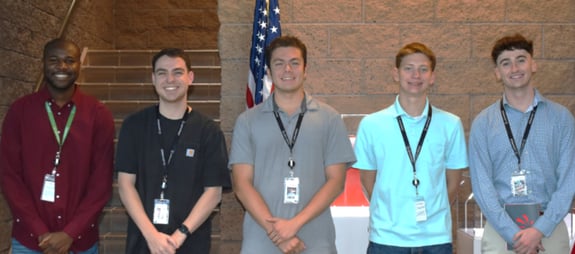
2024 Summer Interns
Leonardo Electronics US provides experiential learning opportunities through our paid internships. We are highly committed to the future young workers of America who are just starting their path to a successful career. Leonardo aims to facilitate students’ interests in STEM subjects and encourages them to pursue a career in the field. Our internships allow students to gain hands-on experience with real-world projects, allowing them to make a meaningful impact on the company’s projects and overall objectives. Interns will join their voices with a community of talented professionals who value and respect each other’s ideas and unique perspectives.
Internships are available throughout the calendar year for undergraduate and graduate students currently enrolled in a related engineering program. Internships are available in the following areas: Industrial, Marketing, Mechanical Design, Optical, Electrical, Test, and Product Development.
Are you interested in gaining hands-on experience? Apply for a Leonardo Electronics US internship.
Meet Our Interns
Discover the inspiring journeys of individuals who launched their careers at Leonardo Electronics US Inc. as interns, spanning engineering, manufacturing, and business.
Summer 2024 Read full bio
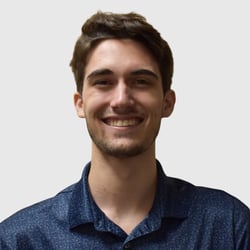
Zack Gruber
What is your role at Leonardo?
Currently, I’m working on a project to essentially stop all possible leaks in laser racks. So, I’m working on a shut-off valve that detects if and when there is a leak and stops the flow of water so that it doesn’t become a large problem.
What do you study in school?
I study Electrical Engineering at Ohio University in Athens, OH.
What are some of your future goals?
After this internship, I’ll probably look for similar internships within electrical engineering, but I would ideally want to work in fusion after college. I feel like working in the renewable energy area would be fun and beneficial to the world in general.
What inspired you to pursue an internship at Leonardo?
I was coming back home from Ohio because I’m born and raised in Tucson, and I was looking for possible internships. I saw that Leonardo was a partner with Lawrence Livermore National Lab. I applied through the Internal Fusion Energy Summer Undergraduate Research Experience (IFE-SURE) as well as through Leonardo. I filled out a resume and answered why I was interested in the internship opportunity. Then, I got an interview, so I interviewed, and they later reached out to me and said they’d love to have me.
What are some challenges you’ve faced and overcome during your internship?
I think one challenge would be timing. For my system, I’ve had to order some parts, so each time I’ve realized I need a new part, it sets me back a week to wait for that one part to be delivered. Other than that, I don’t think there’s been any other challenges.
Most students struggle to see how STEM comes alive in the real world; can you identify how you use it in your day-to-day?
I think it applies in a lot of different situations. For example, when you’re doing any physical activity, you need to figure out how to move optimally. Different movements create different pressures on your muscles. Other day-to-day examples would be working with websites or cars, seeing how those systems function, and understanding the thought process behind them. When you do this, you may think to yourself, “This programmer wanted this to be accessible through these means and that’s why they used this specific menu label.” Other than that, being aware of what is going on in science is always useful because we can understand why things happen the way they do.
Would you recommend an internship and why?
Definitely! I think it gets you a lot of in-field experience, and you get to talk to people who might not even be in your exact field. I’ve talked to people about lasers, different power systems, and more. It’s been a great experience learning about all these aspects that end up partially applying to my field. Also, you find out new things and realize it’s all related.
What do you do outside of your internship?
I hike a decent amount when the weather permits. I also play a lot of volleyball and video games. As far as activities related to engineering, I occasionally help with my old high school robotics team, and I also sometimes take apart electronics for fun.
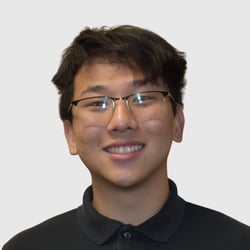
Jonathan Hong
What is your role at Leonardo?
I am currently taking code and finding where the beamlets are in a laser diode array. I have it all written in MATLAB. Basically, I’m transcribing it and making it more efficient in Python. The overall goal is to produce a code that analyzes laser diode arrays using performance metrics and understanding how the product works and what goes right or wrong. With Python, I would say the bulk of it I’ve already known and gotten used to, but some other parts I’ve done for the first time in my life and I’m learning on the job.
What do you study in school?
I’m a double major in Electrical Engineering and Applied Mathematics at the University of Arizona, entering my junior year this fall. After this internship, I may want to specialize in photonics since this has been such a great experience. I’ve just learned so much, I feel like I want to apply it somewhere. I might as well throw that in the mix.
What are some of your future goals?
I’d like to do the accelerated master’s program for Electrical Engineering. I really like math, so I want to do more advanced stuff. After that, I want to get into the industry and design more efficient tools in optics. My main future goal is optimization.
What does a typical day/week look like?
First, I get to work and plan out what I’m going to be doing based on the previous day’s work. It’s always going to be something coding-related, but I need to ask myself if I need to research something or read up on necessary documentation first. Then, I meet with my supervisor and try to talk with him and get his advice. After that, the last few hours, I’m just implementing the strategies and making sure they work. Things don’t get done in a single day. If I need to, I’ll spend the rest of that time testing out things and then celebrating if I get it right!
What do you do outside of your internship?
I would say I read a lot of Mathematics books. I also try to stay active by working out. I’m trying things like rock climbing and soccer. I like cooking a lot, and it’s probably my favorite. I love putting things together, seeing the results, and people’s reactions.
What is the best thing about your current role?
I would say I had an idea of what industry might be like: very serious, you had to get everything right, kind of perfectionist. It’s not like that at all. I’d say the best thing about the internship is everyone working together and the community here that listens to each other.
Has anything happened during your internship that surprised you?
I think it surprised me how relaxed it is here and how friendly everyone is. I guess it was surprising how easy it was to work with everyone, especially with all that I had heard about the industry and how horrifying it might be.
Why was an internship the right path for you? Would you recommend an internship?
I definitely think an internship was the right path for me because I feel like an internship gives you that experience you’re not able to get when doing a personal project. This is what people are looking for. It’s good to get that experience and know what it is you might like or might not want. You don’t really know that until you get an internship. The skills are so invaluable. I could’ve gotten these skills in other ways, but I wouldn’t have been able to do it at this rate. An internship really pushes you and means the work you do is important to a huge group of people. I would recommend an internship. I think the industry is not for everyone. If you throw yourself into it, you’ll end up in unnecessary pain. You need to figure out what you do and don’t want. It’s good to know sooner rather than later.
Most students struggle to see how STEM comes alive in the real world; can you identify how you use it in your day-to-day?
It’s all in the scientific hypothesis. You make a guess or inference on how something’s going to work. You need to define your problem, understand which part you’re interacting with, and then test it out. Validating or disproving theories is the biggest part of science. It doesn’t matter the conclusion you receive. The best part is just seeing things interact in the world. I see it not just in the programming I’m doing, but also in cooking, rock climbing, and even talking to people.
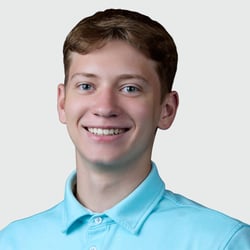
Robert “Bobby” Sulzbach
What has been the biggest difference between your internship experience this year and last year?
Last year was more of a learning curve because I had to get used to the tools and processes the company uses. This year, I came in already familiar with the team and systems, so I was able to jump right into actual engineering and design work.
What skills or knowledge from last year have helped you succeed this time around?
Last year, I spent a lot of time learning how to create models and drawings in SolidWorks. Already being familiar with it this year has made it easier to design things more efficiently and test things in CAD before building or ordering them in real life.
How did your first year of school go? Has it sparked any new interests?
My first year went pretty well. I enjoyed taking physics and engineering courses, especially because I can apply some of what I learned to my work here this summer. I also got to learn the theory behind some stuff I worked on last summer.
Have your career goals or interests shifted since your last time at Leonardo?
Not really. I am still planning to pursue a degree in mechanical engineering. After college, I plan to go into the aerospace and defense industry or aviation. I’m also considering a minor in business administration now to get a stronger understanding of business operations and leadership skills.
What kind of projects have you been working on this time around? Are these projects related to last year’s projects?
This year, I’m working on three projects. One is building a system and running tests to find more cost-effective and efficient filters to use in laser cooling setups. I actually started working on this with another intern last year, but we ran out of time to complete it. This year, I completely redesigned the system and got it up and running, and have been running tests for the past few weeks. I’m also working on designing a specialized box to hold and preheat lenses while they are smoothed with a laser. My final project is making improvements to a previous design for an optical table mover.
What’s it been like reconnecting with the team this year?
It’s been great reconnecting with the team this year. Since I already know most of the people from last year, it’s been easy to jump into projects, and everyone has been helpful and supportive.
Have you taken on any mentorship roles with the new interns this year?
I haven’t really taken on a mentorship role since the new interns this year are in optical and electrical engineering, while I’m in mechanical engineering. Even though we’ve mostly been working on different things, I’ve still gotten to connect with them and see what they’re working on and show them what I’m working on. It’s been a good opportunity to learn more about other engineering disciplines.
What’s one piece of advice you’d give to someone doing this internship for the first time?
I’d say take advantage of opportunities to learn about things outside of your immediate projects, and don’t be afraid to ask questions. There are a lot of really cool projects and things to explore in the facility, so being curious will make the experience more valuable.
What’s something cool or unexpected that has happened during this internship?
One cool part of this internship was getting to send out parts I designed in CAD to get manufactured. Seeing them come back as physical components and using them made the design process seem more interesting and rewarding.
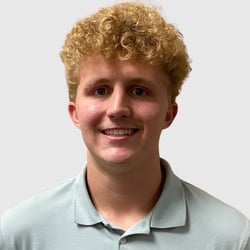
Loudenridge Sundling
What is your role at Leonardo?
Currently, I am working on automating a system to expedite the process of measuring photo diodes. There are a couple of product design projects that I will begin working on shortly. Mostly, I work on optical design and do a lot of coding in Python. I knew a little bit of Python before, but I’ve also learned a lot more.
What do you study in school?
I study Optical Sciences and Optical Engineering at the University of Arizona. I’m going into my Senior year this Fall.
What are some of your future goals?
One of my big goals is to have a patent for a piece of equipment that can go into either a laser or anything else optics-related. Most of my siblings are in the medical field, so finding a way to apply my career to medicine would be great. There’s a lot of applications in optics to medical imaging and developing different mechanisms so you can image things like cancer cells.
How did you find out about the internship with Leonardo? What was the process of applying?
I found out about it from Jason Helmrich, who is actually my supervisor. I talked to a few other companies around the nation about internships and decided I wanted to stay and do an internship in Tucson. I know Jason pretty well, so it’s nice to work under someone I know. I’ve had a lot of opportunities to start the internship off on the right foot and get going quickly.
What related activities are you involved with outside your specific job role?
I play lacrosse at the University of Arizona, and I also coach a high school team at Salpointe Catholic. I’m also coaching a summer team right now: Copper State. For the last two years, I’ve been an outreach coordinator for the optics program. We do STEM events and sometimes do classroom presentations for schools, so I help manage that. The Student Optics Chapter has been a part of optics at the University of Arizona for a while. One of the big things I do is help run Laser Fun Day. We have demos, and it’s a big event for our college. It’s good for the younger kids to introduce optics, as it’s not a well-known subject.
Most students struggle to see how STEM comes alive in the real world; can you identify how you use it in your day-to-day?
Currently, when I’m working, I do a lot of math. I think it changes the way I view the world. A lot of people make judgments based on what they see, but they don’t have a good perception of statistics. Understanding statistics, mathematics, and even physics changes the way I look at how and why things happen. When it comes to my major, I try to notice anything with light, like weird light phenomena in my day-to-day, and I try to characterize them based on the information I know.
What inspired you to pursue an internship?
I worked at one last year. The big thing is getting involved in industry and the workforce as soon as possible. That way, when you step into it, after you get your degree, it’s not so confusing. I’ve always been an individualist, so I’ve always wanted to have my own company. Just getting into the industry and understanding it from a relatively early age means you can apply it in the future.
Has anything happened during your internship that surprised you?
My last internship was with the government, working directly in a division of the Navy. They didn’t allow me to do my own work and contribute to projects. At Leonardo, having the ability to actually contribute to a project someone’s working on makes me feel more important.
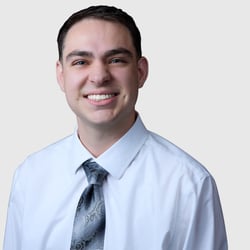
Victor Oviedo
What is your role and some of your responsibilities at Leonardo?
I spend a lot of time shadowing a Product Development Engineer. He showed me how to do a lot of the tests he does in the clean room such as LIV and CS testing. I’ve also been learning how to code in Python to automate one of the data sheets they use.
What do you study in school? What are some specific areas of study you are interested in?
I am about to go into my Senior year at the University of Arizona, and I study Electrical and Computer Engineering. I’m specifically interested in circuit design, and I’ve had interests in lasers and working in the clean room here at Leonardo.
How did you find out about the internship with Leonardo? What was the process of applying?
At first, I was just looking for all kinds of internships. I looked online on websites like Indeed which is where I found the original internship posting. From there, I applied directly on the website. After I applied, I was called in to meet with the Recruiter and then interviewed with the Director of Engineering and the Product Engineering Manager. It was really intimidating at first.
What is your favorite part about being an intern at Leonardo?
I’d say community. I really like working with others at Leonardo. Everyone here is very smart and it’s nice to have someone to rely on when I don’t know something, especially being an intern.
What are some challenges you’ve faced and overcome during your internship?
I’d say the most challenging part has been learning to code since I didn’t have very much experience with that before.
What are some of your future goals?
After graduating in December, I want to stay in Arizona and find a position in either Tucson or Phoenix. I’m keeping it open when it comes to jobs, but I’d like to find a position in electrical engineering for sure.
Any advice for future interns?
I’d say the number one thing is don’t be afraid to ask questions or seek out help from others. I actually got that advice from someone else who did an internship here and is now working a full-time position at Leonardo. For example, when I have questions about coding, I have a source here who I can ask for help. Internships are really a learning experience, so it’s important to ask for assistance when you need it.
Most students struggle to see how STEM comes alive in the real world; can you identify how you use it in your day-to-day?
I feel like having a STEM mindset is really important. We’re always thinking about how to go the extra mile to take shortcuts and make things more efficient. Engineers know how to find those shortcuts and make processes easier.
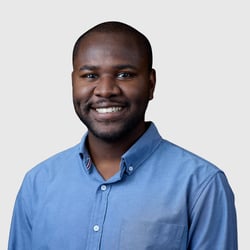
Simon Ngandu
What is your role and some of your responsibilities at Leonardo?
Right now, I’m working on a project in Python programming that analyzes data collected from experiments. I also help in the labs with cleaning and soldering, putting glues to electronic equipment, and so on. There are other times that I get to visit the clean rooms. Those are fun because I get to watch them carry out experiments!
What do you currently study in school?
I go to the University of Arizona. This Fall, I will be going into my Senior year as an electrical engineering student. Right now, I’m considering working with circuit boards or something with electronics and circuit boards.
Why did you decide to join Leonardo for your internship?
I found the internship through my college. There’s a program at the University of Arizona that helps students apply for internships. They had a list of different companies they work with, and Leonardo was one of the companies that joined. Finding a position that was specifically for electrical engineering was great because I get to put into practice what I’ve learned in college which is exciting.
What projects have you worked on so far?
The first week I came here, I had to learn how to use different software like LTspice, Altium Design, and so on. These are software used for designing and carrying out experiments on electrical circuits. The rest of the weeks I’ve been here, I’ve mostly been working on python projects. Once I’m done with that, I’ll be working on designing a PCP that’s an electrical circuit board.
What are some of your future goals?
My goal is to first complete my undergraduate degree and then go straight into the workforce. Once I’ve had some experience and time, I might consider going back to grad school. For now, I want to stay in Arizona because my family is here, but in the future, I might consider moving.
Do you have any advice for future interns?
I would say the things you learn in college are actually important if you pay attention. Sometimes, as students, we only study for the exams and forget everything afterwards. There is some stuff that will be helpful for you in your future career. You just need to know how to find that information when you need it.
What do you do outside of your internship?
Sometimes I like to play the piano and guitar. I’m self-taught, so it takes a while to get myself motivated. I also spend time with my four younger siblings. We watch documentaries together like history, nature, and philosophical ones.
Most students struggle to see how STEM comes alive in the real world; can you identify how you use it in your day-to-day?
I use STEM in my projects I’m working on right now. Once I started doing the internship here, I realized that some of the things I learned in school were actually very important and helped me solve problems. Also, I learned how to use programming languages in college and now I’m using it in my internship.
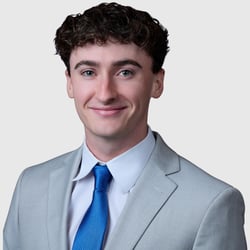
Ryan Ramsden
What do you currently study in school?
I’m going to the University of Arizona, and I’m going to be a Senior this Fall. I’m majoring in Mechanical Engineering as well as getting my minor in Aerospace Engineering. I really like what I’m doing here at Leonardo as what I’m interested in is design engineering, using my creative side and figuring out solutions to problems. All the projects I’ve done here incorporate design work. I’ve been using a software called Solidworks to 3D model and bring my ideas to life.
What inspired you to pursue an internship?
From a young age, I’ve known that internships are great steppingstone to getting your first job. I know how important they are because, without real-world experience, companies are just taking a shot in the dark with you. It’s important to get real-world experience under your belt because schools don’t really teach that. They teach the theories and concepts behind everything, but there’s a lot of things you don’t see coming until you are at a company and get to see all the behind the scenes work.
How did you find out about the internship with Leonardo?
It’s actually a funny story! My landlord ended up telling me about how he works at Leonardo and how there’s a great mechanical engineering team and internship opportunity. I connected with him to learn more about it, and it ended up being exactly what I wanted. I applied, interviewed, and got the job!
What are some challenges you’ve faced and overcome during your internship?
The first challenge I noticed was adapting to this company. I’d only been a lifeguard previous to this job, and it’s a totally different environment.
Also, on the manufacturing side of things, it’s a lot easier to think of an idea than to implement it. I had a concept design review, and I 3D-modeled this design expecting it to be made, but you really have to go into it and think of how you plan on making it, the most cost-effective method, and all of that.
What are some of your future goals?
Ultimately, I want to do something where I can make a difference. I enjoy working in the defense sector. I’ve always had a goal of making my own product, so this design work has helped me see the real-world problems I might run into.
What related activities are you involved with outside your specific job role?
I joined the F1 formula team at the University of Arizona to meet people and get the real-world building aspect through a club. I got a grasp of how everything was coming together. All these different programs came together to make the product. That’s kind of how it is here at Leonardo; you have the engineers, business side, production side, and everyone’s working together to make these lasers and sell them.
Most students struggle to see how STEM comes alive in the real world; can you identify how you use it in your day-to-day?
I would say SolidWorks, the 3D modeling software, really takes an idea, models it in the system, and brings it to life. It has an assembly feature where you can connect different parts and see how they cooperate together. Like a life-size model through the software.
Outside of work, it’s cool to see all the engineering and science behind everything we do day-to-day, from the bridges we cross to the cars we drive. Everything is thought out and well-made through engineering. That’s eye-opening to see how we humans have made all of this work.
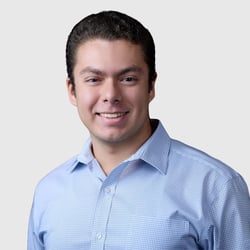
Humberto Rojas Jr.
What is your role and some of your responsibilities at Leonardo?
I help a lot in the Incoming department, just taking regular measurements of parts and making sure they’re up to specifications. More related to quality and processing, I’m working with my boss on deviations which are changes in the way something is being made. We are analyzing those deviations, and, if the tests are successful, we aim to move those processes in the experiment to the actual production process. The overarching project is reducing scrap in the most common part numbers or top-level finished products.
What do you currently study in school?
I am attending the University of Arizona, and I will be a Junior this Fall. My major is Systems Engineering with a minor in Mechanical Engineering. Since I recently switched to Systems Engineering, I would say I’m most interested in the management side of things, and those classes related to how the business purpose ties into the engineering process. Also, I like the idea of systems thinking and how to coordinate the engineering process itself to deliver a product.
What does a typical day and week look like for you?
Usually, I’ll start off the day, for a couple hours, in Incoming, helping get some measurements done. Then, I will either head into a meeting with my boss or work on the projects I’ve been assigned. That will usually go for the rest of the day unless someone requires my help, or they want to show me something new. My main project is finding which steps of the assembly process are causing the most scrap and examining exactly which steps or what variables are playing a role in such a high scrap amount. Whether it be equipment that needs to be maintained or the way the laser is being manufactured, the ultimate goal is less scrap.
As for my typical week, it’s usually the same every day except I usually do more measurements at the beginning of the week, and one-on-one meetings with my boss related to my projects or giving him support as needed towards the end of the week.
Has anything happened during your internship that has surprised you?
I haven’t been taken aback by anything. I guess the amount of detail is surprising with how meticulous the process is which only adds to the complexity of the manufacturing. There’s a lot more than meets the eye. Overall, though, it is pretty similar to what I expected. I expected a lot of optimizations and improving things along the way, so I think it’s in line with that.
Do you have any advice for someone looking to enter your field?
I think one of the most important things is to have a workable attitude and to always seek to learn. I’m a big believer that grades aren’t everything, and, although they are important to a point to show how far you’ve come and what you may have knowledge on, I think having that workable attitude and willingness to learn pays off a lot more. By being able to foster those things, you will be able to pick up more technical skills. Your technical skills will only shine more if you’re able to work well with others and work to your strengths while complementing other’s strengths.
What are some of your future goals?
In terms of my career, there are two potential paths. I have a huge passion for aviation, so I would eventually like to work as a systems engineer for an aerospace company in the development or in the industrial line of manufacturing commercial airplanes. I would either do that or maybe become a pilot, but we’ll see.
What do you do with your free time?
I’m kind of all over the place. I take flight lessons whenever possible. Other times, I’m just in the gym playing sports like soccer, basketball, and pickleball, recently. I also just spend time with friends and family.
Most students struggle to see how STEM comes alive in the real world; can you identify how you use it in your day-to-day?
I would say it comes alive depending on what a customer needs from us. Depending on what they need, it’s easier to see how STEM contributes to the development of a product because you need engineering and science to accomplish what the customer needs to be done via this product. Customers will never get a quality product from anyone unless those principles are present.
Outside of work, I’m a very technical person. For example, in areas like sports, the longer you can play, the better you get at it. Of course, there are things like endurance or your individual skill, but I think developing that skill requires science to do that as optimally as possible because, otherwise, you’d just be wasting your time.
Another area would be video games. There are a lot of games with time restrictions and needing to know what moves or plays you need to make. Based on the ability of that character in the game, there is a lot of math tied in that may be in the back of your mind. I think that plays a big role because that is what wins or loses you games.
Leonardo Electronics US Inc. is an Equal Opportunity Employer. All qualified applicants will receive consideration for employment without regard to race, color, religion, sex, national origin, sexual orientation, gender identity, disability status, protected veteran status, or any other characteristic protected by law.
